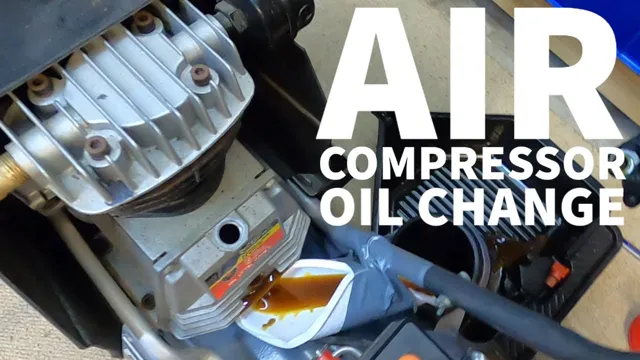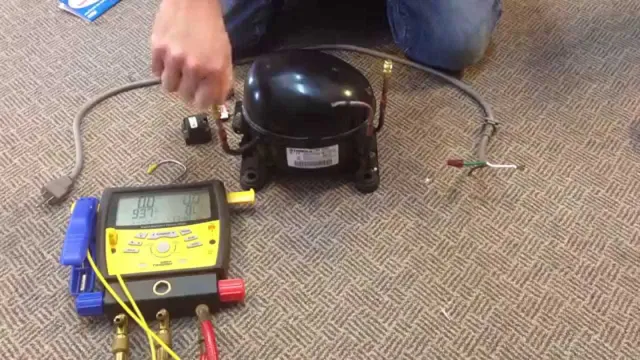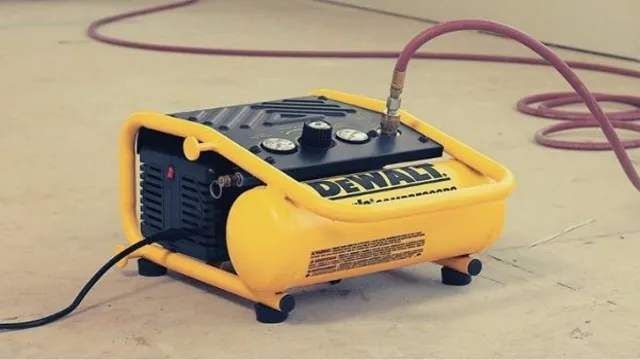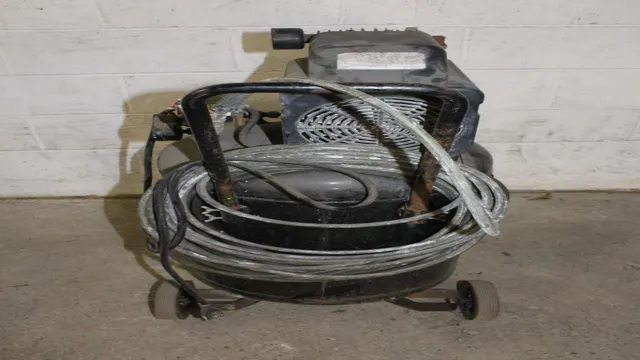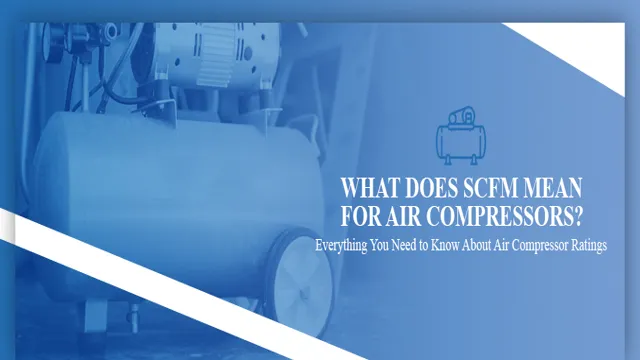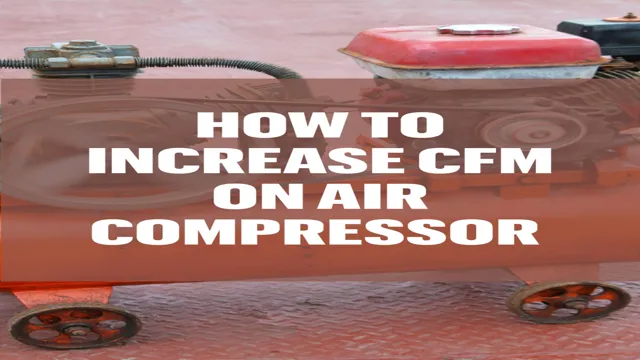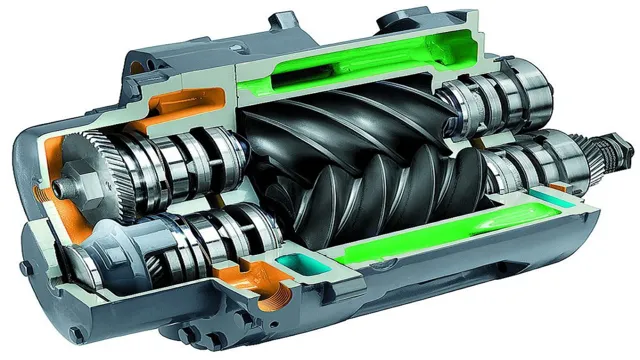Does Air Compressor Run out of Air? Here’s What You Need to Know
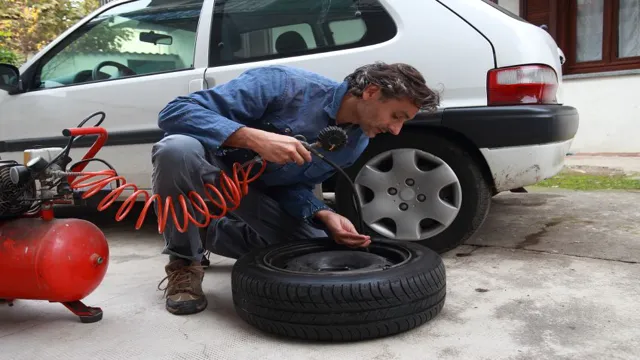
Air compressors are commonly used in various industries to power pneumatically-driven tools and machinery. This powerful equipment compresses air, which is then stored in a tank for later use. But have you ever wondered if air compressors run out of air? The answer is both yes and no! While compressors can continuously produce compressed air, they do have their limits.
Air compressors work by taking air from the atmosphere and compressing it into a smaller space, which increases the air pressure. As more air enters the compressor, the pressure inside the tank increases. Most compressors have a pressure switch that turns the machine off when the maximum pressure is reached.
This means that the compressor will stop producing compressed air until the tank pressure drops and the switch kicks in again. But what if the air compressor is running at full blast for an extended period of time? In this case, the compressor can run out of air or its capacity could be exceeded, leading to decreased performance. It’s essential to monitor the compressor tank pressures and ensure that they do not go below the minimum recommended levels.
In addition, maintaining the compressor’s filters, oil levels, and other components can help maximize its performance and prevent breakdowns. In summary, air compressors do not necessarily run out of air, but they can reach their capacity and stop producing compressed air until the switch turns back on. It’s crucial to maintain the compressor’s components and monitor tank pressure to ensure your equipment operates at peak performance.
How air compressors work
If you’re wondering whether an air compressor will run out of air, the answer is yes – eventually. This is because air compressors work by taking in air from the surrounding environment and increasing its pressure. The compressed air is then stored in a tank until it’s needed to power a tool or inflate a tire, for example.
However, the amount of compressed air that can be stored in the tank is limited, and once you’ve used up all the stored air, the compressor will need to turn on again and refill the tank. The frequency at which this happens will depend on the size of the tank, the pressure required for a particular task, and the demand being placed on the compressor. So, while an air compressor can’t run indefinitely without running out of air, it should be able to supply enough compressed air for most tasks.
How air is compressed
Air compressors work by using a pump to increase the pressure of air to a higher level than the atmospheric pressure. This process is crucial in many industries because compressed air has a variety of uses, from powering tools to providing ventilation. The pump in an air compressor consists of a cylinder with a piston, which moves up and down to compress the air inside.
As the piston moves down, it creates a vacuum, which pulls air into the cylinder. When the piston moves up, it compresses the air and forces it out of the cylinder into a storage tank. The pressure in the storage tank builds up until it reaches a certain level, and then the compressor turns off.
The compressed air can then be used for various purposes, such as inflating tires or powering machinery. An important aspect of air compressors is their efficiency, as they can be expensive to operate. Therefore, choosing the right type of compressor for the job is essential.
Oil-free compressors are ideal for use in environments where contamination is a concern, while lubricated compressors are better suited for heavy-duty applications. By understanding how air compressors work, users can better select the appropriate machine for their specific needs.
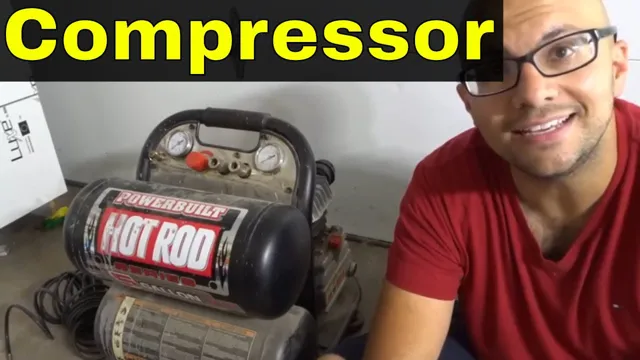
Storage of compressed air
When it comes to air compressors, understanding the storage of compressed air is crucial. Air compressors work by taking in air and compressing it to a higher pressure, which is then stored in a tank. This compressed air can be used for a variety of applications, such as powering tools or inflating tires.
The size of the tank determines the amount of compressed air that can be stored and used. However, it is important to note that compressed air can be dangerous if not stored properly. Tanks must be regularly inspected and maintained to prevent leaks or burstiness.
Additionally, air should never be compressed beyond the manufacturer’s recommended pressure level. Proper storage of compressed air is essential for the safe and effective use of air compressors in various industries.
Factors that affect air compressors
Air compressors are a common tool used in various industrial and household settings. They come in different sizes, types, and power sources. One of the common concerns when using air compressors is whether they run out of air.
The answer is no. Air compressors work by taking in air, compressing it, and storing it in a tank until it is needed. The tank then releases the compressed air through a hose to power tools or inflate tires, for example.
However, several factors can affect the performance of the air compressor and the amount of compressed air it can store. These factors include the size of the tank, the power source, the type of compressor, and the air pressure setting. It’s essential to maintain and service your air compressor regularly to keep it running smoothly and efficiently.
Checking air filters, oil levels, and drainage valves should be included in the regular maintenance routine. By doing so, you can prevent your air compressor from running to the bottom of its tank and prolong its lifespan.
Tank size
When it comes to air compressors, one important factor to consider is the tank size. The larger the tank size, the more air it can hold, and the longer it can operate before needing to refill. However, it’s important to note that a larger tank size also means a larger, heavier, and more expensive compressor overall.
Additionally, the tank size should also be determined by the intended use of the compressor. For example, a smaller tank might be sufficient for DIY projects or small workshops, while larger tanks are necessary for industrial applications. Ultimately, the appropriate tank size will depend on the intended use and budget.
Keep in mind that other factors, such as the horsepower and CFM rating, will also affect the compressor’s performance. So, when choosing an air compressor, it’s important to consider all these factors to ensure you get the right compressor for your needs.
Air usage rate
Air compressors are widely used in various industrial applications, and their performance can be affected by various factors. One such factor is the air usage rate, which refers to the amount of compressed air used by the system over time. The air usage rate depends on the specific application, and it can vary depending on factors like the air pressure required, the size of the system, and the type of equipment being used.
For instance, applications that require a high air pressure will generally have a higher usage rate compared to those that require lower pressures. Similarly, larger systems or equipment with higher demand will also have a higher usage rate. Overall, optimizing the air usage rate is crucial for achieving maximum efficiency and reducing energy costs, and it requires careful consideration of the system’s design and operating parameters.
Power source
Air compressors are an essential tool in many industries, but they are not immune to their own set of factors that can affect their performance. One of the significant factors that impact air compressors is the power source. Air compressors can run on either electricity or gas, and each of these power options has its benefits and drawbacks.
Electric compressors are more efficient, cost-effective, and environmentally friendly than gas compressors. However, electric compressors are limited by the electrical capacity of the facility they are located in, which may not be enough to power larger compressors. On the other hand, gas compressors require no electrical power, making them a more versatile option.
However, they are less efficient and more expensive in the long run. In summary, the power source of an air compressor can significantly impact its performance, and it is essential to consider the specific needs of your operation before selecting a compressor.
Preventing loss of air in air compressors
Does an air compressor run out of air? Yes, it can happen. Compressed air is stored in tanks and used for various applications, from powering tools to inflating car tires. However, air compressors can lose air due to leaks, faulty valves, or poor maintenance.
To prevent build-up pressure from escaping unnecessarily, regular inspections and repairs should be conducted on the air compressor. Checking for cracks or holes in the hoses and valves, ensuring the drain valve is clear and functional, and keeping the tank clean are some of the preventive measures to reduce air loss. Additionally, investing in high-quality parts and lubricants can extend the lifespan of the air compressor and reduce the likelihood of running out of air.
Keeping a monitoring device like a pressure gauge nearby can help track and adjust the settings to maintain optimal performance. Taking care of an air compressor not only prevents air loss but also saves money in the long run by avoiding potential damages and costly repairs.
Regular maintenance
Regular maintenance is crucial to prevent the loss of air in air compressors. In order to keep your compressor running smoothly and efficiently, it’s important to perform routine checks and maintenance. One of the most common causes of lost air is leaks in the compressor system.
These leaks can occur in hoses, connections, valves, and other components. Regularly checking for and repairing any leaks can help to prevent wasted energy and reduced performance. Another important aspect of maintenance is keeping the compressor clean and well-lubricated.
Dirt and debris can accumulate in the machine, causing it to work harder and wear out faster. Lubrication helps to keep the components moving smoothly and reduces friction, which can lead to overheating and other issues. By taking the time to perform these routine checks and maintenance tasks, you can help to prevent the loss of air in your air compressor and ensure that it’s running at peak performance for years to come.
Proper usage and storage
Proper usage and storage of air compressors are crucial for their longevity and efficiency. One of the essential factors to consider is preventing the loss of air. Air compressors work by compressing air to a higher pressure than the atmospheric pressure to power tools and machinery.
However, air leaks in the compressor system can cause the pressure to drop, sabotaging the equipment’s functionality. To prevent air loss, regularly check the connections, fittings, and valves for any damages or leaks. Moreover, drain the compressor’s tank after each use to get rid of any accumulated moisture, which can corrode the system and cause leaks.
Finally, store the compressor in a dry, well-ventilated area, away from extreme temperatures and moisture, which can further damage the system. By following these proper usage and storage practices, you can ensure your air compressor’s optimal performance and durability, saving you both time and money.
Conclusion
In short, no. An air compressor doesn’t run out of air, but the air tank does eventually need to be refilled. Think of it like a water bottle – the bottle may run out of water, but that doesn’t mean the water source has disappeared.
The air compressor continually takes in air and compresses it into the tank, so as long as there is a source of air, the compressor can keep running and producing compressed air. So, fear not my friends, your air compressor will keep on humming as long as it has a steady supply of air to compress.”
FAQs
What are the common reasons why an air compressor runs out of air?
The common reasons are as follows: air leaks, insufficient oil, regulator problems, or a malfunctioning check valve.
How often should I check the oil level of my air compressor?
You should check the oil level of your air compressor every time before you use it. It is recommended to change the oil after every 50-100 hours of use.
What is the ideal pressure range for an air compressor?
The ideal pressure range for an air compressor is between 90 to 100 PSI (pounds per square inch).
What precautions should I take when working with an air compressor?
You should always wear protective gear like safety glasses and gloves, never point the air nozzle at a person or body part, and make sure the air compressor is properly grounded.
How can I fix an air compressor that keeps running but does not build pressure?
You may need to replace the pressure switch or clean the air intake filter. If these solutions do not work, it may be an issue with the pump or motor and require professional repair.
What is the normal lifespan of an air compressor?
A well-maintained air compressor can last for around 10 to 15 years. Regular maintenance and inspections will prolong the lifespan of the unit.
Can an air compressor work without an air filter?
No, an air compressor needs an air filter to prevent dust and debris from entering the system, which can cause damage and decrease the lifespan of the compressor.

